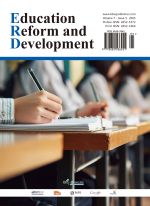Abstract
In the context of globalization, higher vocational English teachers play a vanguard role in the internationalization process of vocational education, contributing a unique perspective to foreign exchanges and cooperation and laying a solid foundation for accelerating the internationalization process of schools and promoting high-quality development. Inspired by the educational internationalization practice of the EU’s “Erasmus+” Programme, higher vocational English teachers can improve their international competence through ways such as enhancing international awareness, optimizing the international curriculum system, strengthening international cooperation and academic research capabilities, cultivating the awareness and ability of lifelong learning, improving teaching innovation capabilities, enhancing cross-cultural communication capabilities, and boosting national cultural confidence, injecting new vitality and inexhaustible impetus into the international transformation and development of China’s vocational education.
References
Wu C, Song Y, 2018, Changes and Prospects of the Internationalization Development of China’s Higher Education in the 40 Years Since the Reform and Opening-Up. China Higher Education Research, 2018(12): 53–58.
Kong L, Wang H, 2017, Theoretical and Practical Exploration of the Cultivation of Tibetan-Chinese-English Bilingual Teachers. Science Press, Beijing, 1–7.
Wang Y, 2018, Research on the Organizational Strategies for the Internationalization Development of First-Class Universities in the UK, thesis, Zhejiang University.
European Union Committee, 2006, Proposal for a Decision Establishing an Integrated Action of Lifelong Learning Program 2007–2013, visited on November 10, 2024, https://www.eumonitor.eu/9353000/1/j9vvik7m1c3gyxp/vhgb1cirhbzv.
Lin Y, Zhang D, 2023, Towards 2030: The Management Model and New Development Trends of the EU Erasmus Programme. Public Diplomacy Quarterly, 2023(2): 107–117.
Guo Y, 2023, The Current Development Status and Enlightenment of the Teacher Mobility Project under the “Erasmus+” Programme. Higher Education Forum, 2023(11): 23–26.
European Commission, 2023, Erasmus+ Programme Guide, visited on October 12, 2024, https://erasmus-plus.ec.europa.eu/programme-guide/part-b/part-b-information-about-the-actions-covered-by-this-guide.
Erasmus Learning Academy, 2024, 2024–2025 Erasmus Plus Course Catalogue, visited on February 10, 2025, https://www.erasmustrainingcourses.com/course-catalogue.html.
The General Office of the Central Committee and the General Office of the State Council, 2022, Opinions on Deepening the Reform of the Modern Vocational Education System Construction. People’s Daily, 2022-12-22(001).
Li Q, 2021, Enlightenment of the “Erasmus+ Programme” on the Development of Education Internationalization in Local Universities. Journal of Tongren University, 23(6): 41–49.
Qin C, Ren Y, 2024, The Internal Logic, Realistic Situation, and Strategic Choices of the “Five Gems” Construction in Vocational Education – A Qualitative Research Based on the Grounded Theory. Vocational and Technical Education, 45(29): 37–44.
Jiang C, Sun M, 2024, An Analysis of the High-Quality Development Path of the Internationalization of China’s Higher Vocational Education – A Fuzzy-Set Qualitative Comparative Analysis of Typical Cases under the “Belt and Road” Initiative. Higher Education Education Management, 18(6): 111–124.
Lan L, 2021, Building a Modern Education System to Serve Lifelong Learning for All – Government Responsibilities and Legislative Design. Educational Research Monthly, 2021(9): 3–10.
Costa A, 2020, The Bilingual Brain and What It Tells Us About the Science of Language. Penguin Random House, New York, 28–60.
Afonso C, 2006, Formação de Professores de Línguas Estrangeiras: Reflexões, Estudos e Experiências. Porto Editora, Porto, 450–458.
